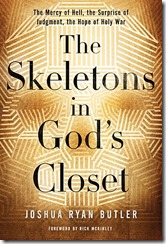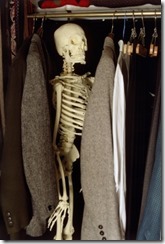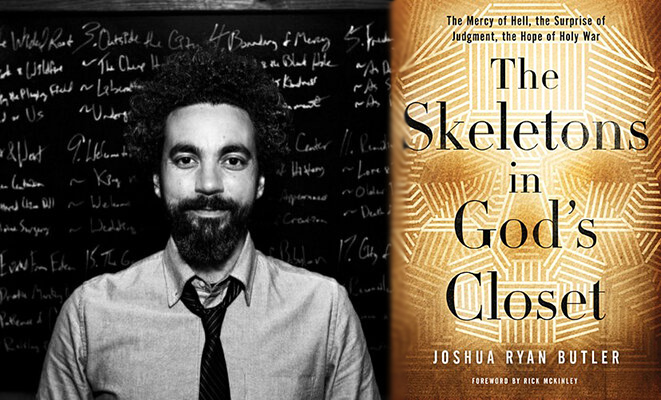
What aspects of Christianity make it hard for you to really, fully follow Jesus? Maybe it’s how the Church treats LGBT people. Or a congregation’s attitude toward women in ministry. Maybe it’s Bible’s complicated, complex history of transmission, and the way texts are handled by some denominations.
Or maybe there are some foundational doctrines that just give you the willies. Doctrines that, if you look too closely at them, it’ll actually turn out that God isn’t very good at all, that God is a spiteful, tribal war god who only loves those that love him and punishes everyone else for eternity.
Josh Butler calls these doctrines the “Skeletons in God’s Closet”, and in his new book, he’s dragging them out into the light of day.
For this book, Josh focuses on three particular doctrines many Christians find troubling: Hell, the Last Judgment and Holy War. Are there more? Most certainly. Is three enough for one book? Unquestionably.
 In The Skeletons in God’s Closet, Josh carefully works through each of these issues. He claims that each issue is a “skeleton” because it’s become caricatured in the larger cultural discussion. So, for instance, Hell is a counterpart of Heaven, one of two possible eternal destinations that awaits us after death – one reserved for those who weren’t good enough.
In The Skeletons in God’s Closet, Josh carefully works through each of these issues. He claims that each issue is a “skeleton” because it’s become caricatured in the larger cultural discussion. So, for instance, Hell is a counterpart of Heaven, one of two possible eternal destinations that awaits us after death – one reserved for those who weren’t good enough.
With each issue, Josh works carefully through Scripture, Church tradition, reason and his own experiences to reframe the conversation. He offers profound insights from across the Christian tradition, and establishes a more orthodox understanding of these issues.
As Josh claims in the introduction:
God is good… In the chapters that follow, I will seek to demonstrate that God’s goodness is continuous with, not contradictory to, these tough topics of hell, judgment and holy war. Indeed, that it is precisely because of God’s goodness, not in spite of it, that these topics arise.
How well does Josh reframe these skeletons? Do they become avatars of hope?

To a large extent, Josh succeeds. His treatments of these issue elevates the discussion to a serious-but-accessible level Evangelicals need. I don’t know very many people who take their faith seriously who don’t honestly struggle with these very issue. Josh’s words will be a welcome guide (especially if you use the free discussion guide he offers to do this as a group study!).
You probably won’t agree with everything Josh offers. In particular, I wasn’t wholly convinced by his discussion of the Canaanite genocides (though his treatment is excellent, and immeasurably better than what comes from some pastors). Either way, The Skeletons in God’s Closet will help you to think more clearly about some very difficult topics. That alone is worth your time.
It’s also worth mentioning that The Skeletons in God’s Closet is not exactly an apologetics book. Josh doesn’t write to non-Christians to defend the faith. This book is written to Christians. Josh doesn’t defend the authority of Scripture; he assumes you’re already in the same neighborhood as he is.
That’s not to say those who don’t share Josh’s (and my) Evangelical outlook won’t find the book profitable. This is some of the clearest, most accessible writing I’m aware of that directly and purposefully deals with these challenging doctrines. Even if you’re not an Evangelical but you’d like to hear an excellent representation of Orthodox Christian engagement that doesn’t shy away from the potential ugliness of these issues, The Skeletons in God’s Closet is a book you need you be reading.
More on The Skeletons in God’s Closet:
- Hear Josh discuss the Mercy of Hell on the StoryMen Podcast. (And win a free copy!)
- Download a free sample chapter of the book here.
- Get the book on Amazon.
- Check out the awesome book trailer:
BOTTOM LINE: If you want a thoroughly researched, carefully thought-out exploration of these difficult topics that’s still accessible, get The Skeletons in God’s Closet.
YOUR TURN: What’s the Skeleton in God’s closet you’re most afraid of?
Disclosure of Material Connection: I received this book free for review purposes from the author. I was not required to write a positive review. The opinions I have expressed are my own. I am disclosing this in accordance with the Federal Trade Commission’s 16 CFR, Part 255: “Guides Concerning the Use of Endorsements and Testimonials in Advertising.”

